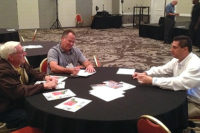The learning began with a presentation from visibility coach David Avrin. Avrin spoke about the need to be different and stand out in the marketplace.
“About 10 years ago there was a huge emergence of branding as an exercise to brand your company,” Avrin said. “The reality is branding is just a catch-all term. It comes down to what people think of when they hear your name. All of a sudden everyone was a branding expert. It comes down to what we do and what we say to have people think of us like we want to be thought of.”
The visibility coach pointed out that this thought could be positive or negative. He asked the salespeople what thoughts come to mind when he says Wal-Mart, Chick-fil-A, or Jerry Sandusky.
“You do not own your brand. Your brand resides in the minds of the people you work with and work for. What do they think of you? We have no control over that but we have great influence,” Avrin said.
Standing Out
Avrin believes that your biggest competition does not come from your competitors, but rather from anonymity. If consumers do not know you, you are not even in the competition. “All things being equal, we are going to shop on price or proximity. Whoever is the cheapest or the closest we will go with. Things are never equal, but if I am a customer and keep hearing the same things from every company then we think everything is equal. That is your responsibility to change their thinking. Even if you are in the premium category, you can be price competitive in that category.”
According to Avrin, in order for price not to be the deciding factor, you need to give customers a reason to choose you. However, this reason needs to be different from what the competition is saying. If you are talking about your caring employees, commitment to excellence, good customer service, etc., then you are not differentiating yourself. That just puts you on par with the other companies because they are saying the same things. And when everyone is on par, people choose based on price.
He recommends doing a true competitive analysis of your marketplace. You can do this by taking all of your printed materials and a printed copy of everything on your website and spreading it on a table. You then take your top two competitors and spread their material out.
“How do you know how to compete against your competitor until you know what they are saying about themselves and how they are competing against you? Have a spouse call and request materials. We get very myopic. Highlight things. You will be stunned at how much that verbiage is identical to what you say about yourself,” Avrin said.
“Many of you have spent years building your experience and expertise in the marketplace. You have spent millions of dollars building infrastructure. But most people have only spent minutes crafting the words they use to describe what they do.”
The salespeople were told to do a deeper dive and identify what is remarkable about their company. Avrin spoke of a purple cow and how it is remarkable because it is worthy to be remarked about. The question a company needs to answer is: What question would elicit your name as the best response?
“The marketplace celebrates specialists. A mistaken belief is that everyone is always trying to make the best choice possible. That is wrong. People are looking to avoid making a bad decision. They are assuming everyone can do it but who is the safest choice? They need to answer to somebody,” Avrin said. “We live in this HVAC world. The people who do business with us live in their world and step into ours briefly to engage in these conversations. We need to make sure we understand their world, their language, and their lingo.”
The attendees got a lot out of the presentation. “I came to the conclusion that with minor tweaks to creating differentiators we can have remarkable results,” said David Dickins of Interstate Mechanical.
Team Competition
Like many Unified Group trainings, there was work to be done before anyone stepped foot into the meeting room. Prior to the session, attendees were split into four teams, coaches and team leaders were assigned, and a Request for Proposal (RFP) they would work through during the session was sent out.
After a verification call exercise, the teams prepared for their presentation to the board. Each group utilized unique offerings that each of their companies offer to stand out from the others.
“Before the session we assigned agreement prices for each group so they didn’t sell on price,” explained Jim Bartolotta, Unified Group managing partner. “They really had to come up with differentiators that would make us [the board] care and want to do business with them.”
In the end it was Team Two who walked away with the business. “Scoring was based on being creative, thinking outside the box, and validating claims,” explained Bartolotta. “Team Two did this with their full coverage offering, full labor, EnergyPrint and free maintenance for the first year on rooftops.”
Team two was made up of Chris Luberto (MSC), Kevin Spaeth (Spaeth Inc.), Kevin Almon (Vital Mechanical), Alex McWilliam (DebonAir Mechanical), Jennifer Varkalis (Air Comfort), Todd Stark (HPE), and Todd Meloy (Shoffner Mechanical).
Publication date: 11/12/2012




